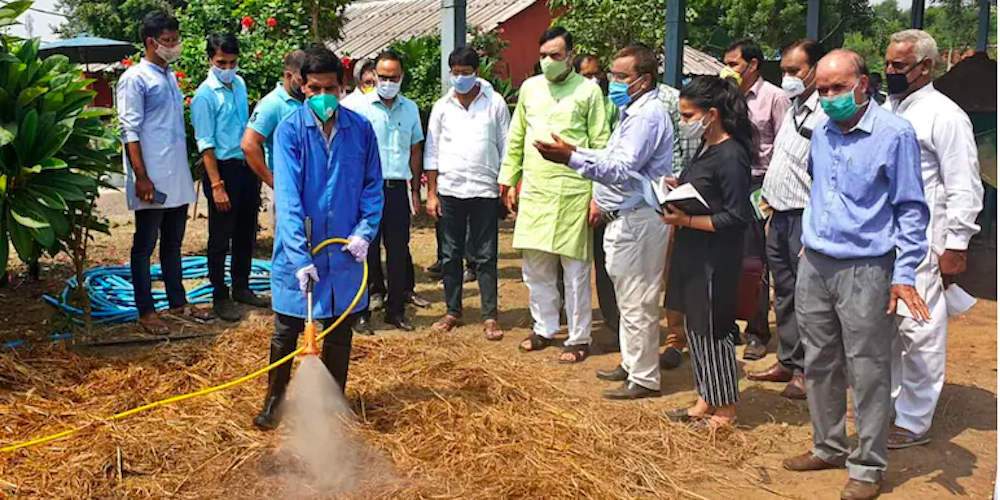Bio-Decomposer Technology for Stubble Burning

The bio-decomposer namely Pusa Decomposer developed by The Indian Council of Agricultural Research (ICAR) has been used by the States of Punjab, Haryana, Uttar Pradesh and NCT of Delhi to total of 978,713 acres (3,91,485 ha) equivalent to about 2.4 million tonnes of straw management in this year.
Also, to support the efforts of the Governments of Punjab, Haryana, Uttar Pradesh and NCT of Delhi to address air pollution and to subsidize machinery required for management of crop residue (Cropping System Model-CSM), a Central Sector Scheme on ‘Promotion of Agricultural Mechanization for In-Situ Management of Crop Residue in the States of Punjab, Haryana, Uttar Pradesh and NCT of Delhi’ is implemented from 2018-19.
Under this scheme financial assistance @ 50% of the cost of machinery is provided to the farmers for purchase of identified crop residue management machinery and financial assistance @ 80% of the project cost is provided to the Cooperative Societies of Farmers, Farmers Producers Organization (FPOs), Registered Farmers Societies and Panchayats for establishment of Custom Hiring Centres (CHCs) of identified crop residue management machinery.
During the period from 2018-19 to 2021-22, a total of more than 2.13 lakh crop residue management machines have been supplied to these established CHCs and to the individual farmers in these 4 States (Punjab- 85386 Nos., Haryana- 72237 Nos., Uttar Pradesh – 55711 Nos. and NCT of Delhi – 202 Nos) which also include more than 1889 balers (Punjab -264 Nos., Haryana -973 Nos. and Uttar Pradesh – 652 Nos.)
It may be noted that the bio-decomposer capsule, developed by Pusa Institute, is made into a solution through a week-long process and then sprayed on stubble and straw left behind on fields after harvesting. The Delhi government first sprayed it last year and it claimed that the results were positive.
The Decomposer is a mix of seven fungi that produce enzymes to digest cellulose, lignin and pectin in paddy straw. A liquid formulation is formed using decomposer capsules and fermenting it over 8-10 days and then spraying the mixture on fields with crop stubble to ensure speedy bio-decomposition of the stubble. The farmers can prepare 25 litre of liquid mixture with 4 capsules, jaggery and chickpea flour. The mixture is sufficient to cover 1 hectare of land.It takes around 20 days for the degradation process to be completed.
Benefits of PUSA decomposers are that they Improve the fertility and productivity of the soil as the stubble works as manure and compost for the crops and lesser fertiliser consumption is required in the future. Decomposer is an efficient and effective, cheaper, doable and practical technique to stop stubble burning. It is an eco-friendly and environmentally useful technology.
Meanwhile, the satellite-based monitoring has indicated that a total 82533 paddy residue burning events were detected in Punjab, Haryana and Uttar Pradesh in 2021 season which are 7.71% less than in 2020.As per the monitoring report, paddy residue events in Haryana increased from 4,202 in 2020 to 6,987 in 2021, while in Punjab events decreased from 83,002 in 2020 to 71,304 in 2021. Similarly, the satellite estimated paddy burnt area in Haryana increased from 216,000 ha in 2020 to 354,000 ha in 2021, while in Punjab the paddy burnt area decreased from 1.66 Million ha in 2020 to 1.59 Million ha in 2021, says the Union Minister of State for Environment, Forest & Climate Change, Shri Ashwini Kumar Choubey.



